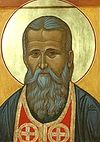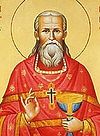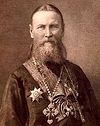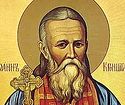

| Previous day | Next day |
| Old Style
June 1
|
Sunday |
New Style
June 14
|
| 1st Sunday after Pentecost. Sunday of All Saints. Tone 8. | No fast.
|
![]() Martyrs Justin the Philosopher, and those with him at Rome: Chariton, Charita, Euelpistus, Hierax, Paeon, and Valerian (Liberianus) (166).
Martyrs Justin the Philosopher, and those with him at Rome: Chariton, Charita, Euelpistus, Hierax, Paeon, and Valerian (Liberianus) (166). ![]() St. Dionysius of Glushitsa (Vologda), monastic founder (1437). Righteous John, Wonderworker of Kronstadt (Glorification 1990)
St. Dionysius of Glushitsa (Vologda), monastic founder (1437). Righteous John, Wonderworker of Kronstadt (Glorification 1990)
St. Agapitus, unmercenary physician, of the Kiev Caves (11th c.). St. Justin (Popovic), archimandrite, of Chelije in Serbia (1978). Sts. Shio the New, David, Gabriel, and Paul, of Gareji, Georgia (1696-1700).
Martyr Thespesius of Cappadocia (230). Martyr Firmus of Magus (284-303). St. Mertius the Farmer, of Myra in Lycia (912).
Repose of Metropolitan Tryphon (Turkestanov) of Dmitrov (1934) and Elder Philaret of Kapsala, Mt. Athos (1975).
Thoughts for Each Day of the Year
According to the Daily Church Readings from the Word of God
By St. Theophan the Recluse

Sunday of All the Saints. [Heb. 11:33–12:2; Matt. 10:32–33, 37–38; 19:27–30]
The Holy Church commemorates Saints every day. But because there have been God-pleasers who struggled in obscurity and were not revealed to the Holy Church, the Church has set a day on which we praise all those who have pleased God throughout the ages, that they all might be glorified by the Church. The Church instituted this commemoration immediately after the descent of the Holy Spirit, because all saints have been made and are being made saints by the grace of the Holy Spirit. The grace of the Holy Spirit brings repentance and the forgiveness of sins; it leads one into battle with the passions and lusts, and crowns this labor with purity and passionlessness. And thus a new creature appears, fit for a new heaven and new earth. Let us be zealous to follow the saints of God. Today’s Gospel reading teaches us how to do this: it demands fearless confession of faith in the Lord, particular love toward Him, raising the cross of self-denial, and heartfelt renunciation of everything. Let us place a beginning according to these instructions.
Articles
 Martyr Justin the Philosopher and those with him at RomeThe Holy Martyr Justin the Philosopher was born around 114 at Sychem, an ancient city of Samaria. Justin’s parents were pagan Greeks. |















